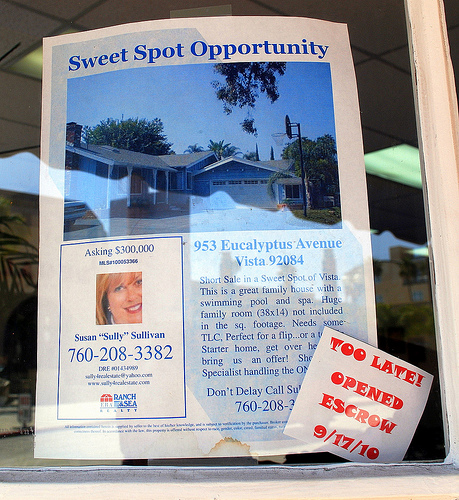When someone who owes a debt transfers property out of their name in order to prevent the creditor from collecting against that property, the transfer may be set aside under the Uniform Fraudulent Transfer Act. A classic move seen by business and real estate attorneys is the transfer of real estate to someone who disappears and cannot be served with a summons and complaint. This does not necessarily end the story, as the fraud is so obvious that the courts will not aid them in their fraud. In a recent decision involving an obviously fraudulent conveyance, the new owner of the property had been in prison and was subsequently deported to Mexico. That was not enough to keep the creditor from undoing the transaction.
 In Diana Buchanan v. Ramon Soto, Maria Soto bought a business from Buchanan for over $300 thousand but did not pay for it. The plaintiff was in the process of obtaining a judgment against Maria, when Maria transferred her real estate in Vista, CA to her husband Ramon as his separate property. Plaintiff sued Maria & Ramon to undo the fraudulent conveyance. Of course, Ramon could not be found, because he was deported due to criminal activity, and was somewhere in Mexico. The plaintiff asked Maria where, but Maria did not know where other than rural Mexicali.
In Diana Buchanan v. Ramon Soto, Maria Soto bought a business from Buchanan for over $300 thousand but did not pay for it. The plaintiff was in the process of obtaining a judgment against Maria, when Maria transferred her real estate in Vista, CA to her husband Ramon as his separate property. Plaintiff sued Maria & Ramon to undo the fraudulent conveyance. Of course, Ramon could not be found, because he was deported due to criminal activity, and was somewhere in Mexico. The plaintiff asked Maria where, but Maria did not know where other than rural Mexicali.
The court allowed plaintiff to serve Ramon by publication. A trial was held, and the plaintiff won. Ramon tried to set aside the judgment due to lack of service, but failed. They appealed, claiming that the California court lacked personal jurisdiction because Ramon had not been properly served.
The appellate court started by noting that California courts may exercise personal jurisdiction over nonresidents who have sufficient “minimum contacts” with the state. Minimum contacts exist where the relationship between the resident and the forum state is such that the exercise of jurisdiction does not offend “‘traditional notions of fair play and substantial justice’ ” under the due process clause.
Personal jurisdiction may be either general or specific.
General Jurisdiction –
A nonresident defendant may be subject to the general jurisdiction of the forum if his or her contacts in the forum state are ‘substantial … continuous and systematic.’
[i]f the nonresident defendant does not have substantial and systematic contacts in the forum sufficient to establish general jurisdiction, he or she still may be subject to the specific jurisdiction of the forum
 Specific Jurisdiction
Specific Jurisdiction
Specific jurisdiction exists when (1) the defendant has purposefully availed himself or herself of doing business in the state; (2) the controversy at issue arises from or is related to the defendant’s forum-related contact; and (3) assertion of jurisdiction would be reasonable.
Purposeful Availment
The rule is that one who owns real property in a state purposefully avails themselves of the benefits and protections of the laws of that state. Here, Maria transferred her interest in her properties to Ramon in July 2011. As the then-owner of Maria’s interest in the properties, the court concluded Ramon purposefully availed himself of the benefits and protections of the laws of California. Once Ramon obtained— and kept— an interest in Maria’s properties, his contacts with California became purposeful and not “ ‘random,’ ‘fortuitous,’ or ‘attenuated.’
Arising Out of…
The next element of the specific jurisdiction test requires that the controversy relate to or arise out of the defendant’s contacts with the forum. The cause of action must arise out of an act done or transaction consummated in the forum. In other words, there must ‘be a substantial nexus or connection between the plaintiff’s cause of action and the defendant’s forum contacts.
The court concluded that there would be no fraudulent conveyance without Maria’s transfer of the property to Ramon. This was a substantial connection, or n4exus, between Ramon’s acquiring the property and the cause of action.
Reasonableness
Once the above tests have been passed, the court considers the contacts in light of other factors to determine whether the assertion of personal jurisdiction would comport with “fair play and substantial justice.” Here, jurisdiction was reasonable. Ramon hired counsel and participated in the fraudulent conveyance action. He was a necessary party to the action. Maria’s main defense was that Ramon was an indispensible party.
Photos:
flickr.com/photos/djandywdotcom/25034635073/sizes/c/
flickr.com/photos/joebehr/5614027469/sizes/m/
 California Real Estate Lawyers Blog
California Real Estate Lawyers Blog

